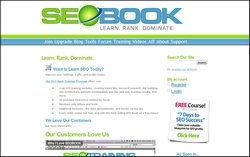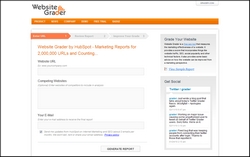SEO (short for Search Engine Optimization) is the active, on-going process of getting your pages at the top of search engine rankings for the search terms of your choice. Prior to that, you must determine specific keywords to target by doing some keyword research. These keywords should ideally be high search, low competition, buying keywords that are likely to drive targeted traffic to your site.
SEO is one of the most cost-effective marketing techniques available as search engines can generate huge amounts of free traffic to your online presence when ranking well for high search keywords. Typically, the higher a page appears in the search results, the more visitors it will receive.
SEO encompasses improving internal (on-page) aspects as well as external (off-page) aspects. Improving on-page aspects includes optimizing your page titles, meta tags, headings, body content, etc. Improving off-page aspects includes building high quality inbound links, etc. Search engines use algorithms based on both on-page and off-page aspects to rank pages.
You should consider optimizing your:
- Page titles
- Headings (H1, H2, etc.)
- Body content
- Anchor text
- Permalinks
- Alt attributes
There are lots of other on-page aspects that you may want to optimize for search engines but these are generally considered as the most important ones. If you really want to go deeper into knowing which internal and external aspects are considered as important, you should read this report by SEOmoz: Search Engine Ranking Factors (2009).
SEOBook is full of useful tools and resources to optimize your online presence for search engines. This site is widely considered as the #1 SEO Resource and you will definitely understand why after you sign up! The SEO Toolbar is very useful to monitor several important aspects of any site. Another great resource is Website Grader. This site will scan your site and grade it, giving you a few hints on how to improve it for search engines.
Recommended resources
|
SEO Book |
Website Grader |
Once again, make sure you target specific keywords before starting to optimize your pages. Several experts consider off-page optimization as more important than on-page optimization. This might be right, but you should still consider spending some time optimizing your pages to make sure you aren’t missing out on anything!
A MUST HAVE if you use WordPress:
If you don’t already use this wordpress plugin, I can’t suggest it highly enough. I now use it on ALL my blogs (including all the niche blogs I make, I have over 100 of them) and it is awesome for making sure your page is ready for the search engines. It is called SEOPressor and I have to say that there are not many simple tools that I feel are worth paying for, but SEOPressor is powerful and is well worth it.
The Plugin asks you to enter in the keyword that you are targeting for that post (the term you want to rank in the search engines for) and then when you publish it, it gives you feedback on what you should add etc. to improve the on-page SEO. So grab SEOPressor today if you haven’t already.









 I'm an avid fan of your blog, and the content is always top notch - great reading. I'm always impressed with the variety of content and the way you get all the important steps outlined for processes, but still manage to keep it short and simple - few people do that quite as well.
I'm an avid fan of your blog, and the content is always top notch - great reading. I'm always impressed with the variety of content and the way you get all the important steps outlined for processes, but still manage to keep it short and simple - few people do that quite as well. Mike Purvis
Mike Purvis
 Andy Fletcher
Andy Fletcher Todd Gross
Todd Gross
Leave a Reply